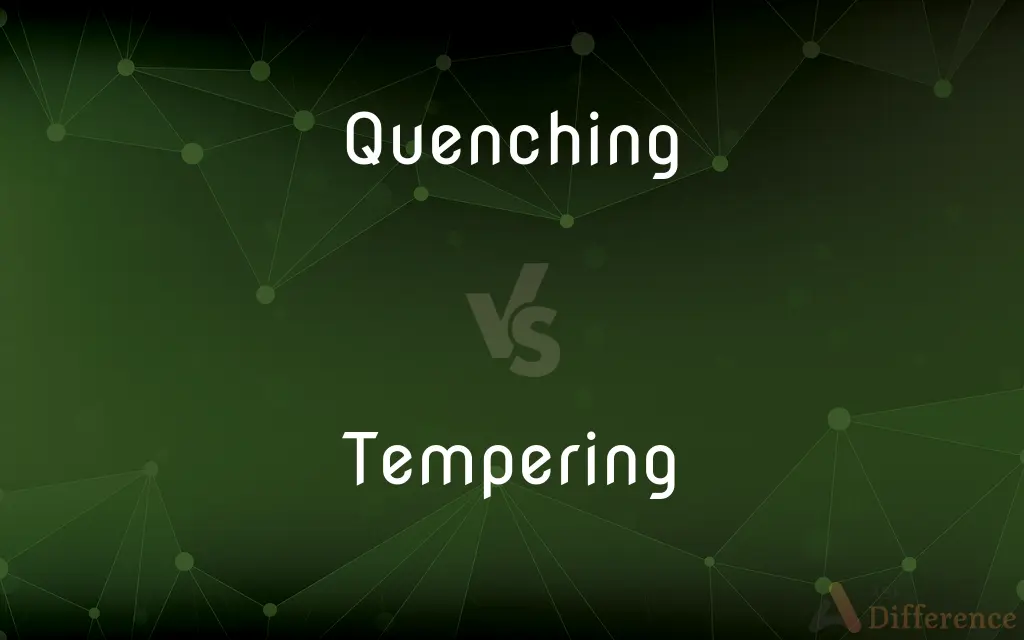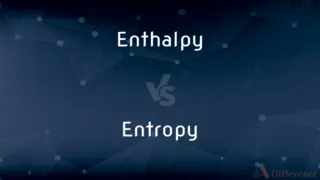Quenching vs. Tempering — What's the Difference?

Difference Between Quenching and Tempering
ADVERTISEMENT
Compare with Definitions
Quenching
In materials science, quenching is the rapid cooling of a workpiece in water, oil or air to obtain certain material properties. A type of heat treating, quenching prevents undesired low-temperature processes, such as phase transformations, from occurring.
Tempering
To modify by the addition of a moderating element; moderate
"temper its doctrinaire logic with a little practical wisdom" (Robert H. Jackson).
Quenching
To put out (a fire, for example); extinguish.
Tempering
To bring to a desired consistency, texture, hardness, or other physical condition by blending, admixing, or kneading
Temper clay.
Paints that had been tempered with oil.
Quenching
To suppress; squelch
The disapproval of my colleagues quenched my enthusiasm for the plan.
ADVERTISEMENT
Tempering
To harden or strengthen (metal or glass) by application of heat or by heating and cooling.
Quenching
To slake; satisfy
Mineral water quenched our thirst.
Tempering
To strengthen through experience or hardship; toughen
Soldiers who had been tempered by combat.
Quenching
To cool (hot metal) by thrusting into water or other liquid.
Tempering
(Music) To adjust (the pitch of an instrument) to a temperament.
Quenching
(physics) The extinction of any of several physical properties.
Tempering
To be or become tempered.
Quenching
(metallurgy) The rapid cooling of a hot metal object, by placing it in a liquid, in order to harden it.
Tempering
A state of mind or emotion; disposition
An even temper.
Quenching
(astronomy) A process in which a galaxy loses cold gas, thus strongly suppressing star formation.
Tempering
Calmness of mind or emotions; composure
Lose one's temper.
Quenching
(botany) The dissipation of energy from light in excess of what can be used for photosynthesis.
Tempering
A tendency to become easily angry or irritable
A quick temper.
Quenching
Present participle of quench
Tempering
Anger; rage
A fit of temper.
Quenching
The act of extinguishing; causing to stop burning;
The extinction of the lights
Tempering
A characteristic general quality; tone
Heroes who exemplified the medieval temper.
The politicized temper of the 1930s.
Tempering
The condition of being tempered.
Tempering
The degree of hardness and elasticity of a metal, chiefly steel, achieved by tempering.
Tempering
A modifying substance or agent added to something else.
Tempering
(Archaic) A middle course between extremes; a mean.
Tempering
Present participle of temper
Tempering
The act by which something is tempered.
Tempering
The process of giving the requisite degree of hardness or softness to a substance, as iron and steel; especially, the process of giving to steel the degree of hardness required for various purposes, consisting usually in first plunging the article, when heated to redness, in cold water or other liquid, to give an excess of hardness, and then reheating it gradually until the hardness is reduced or drawn down to the degree required, as indicated by the color produced on a polished portion, or by the burning of oil.
Tempering
Hardening something by heat treatment
Tempering
Moderating by making more temperate
Share Your Discovery

Previous Comparison
Laser vs. Maser
Next Comparison
Enthalpy vs. Entropy













































